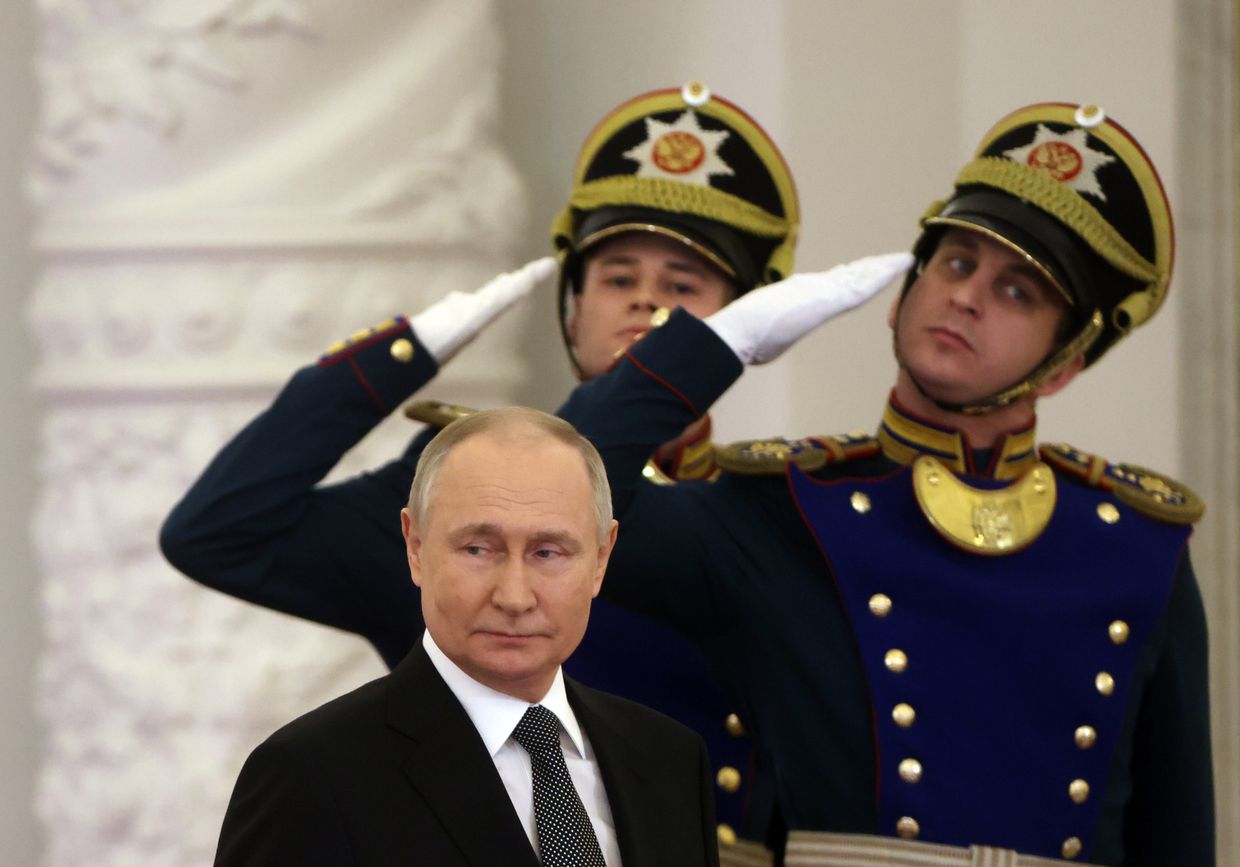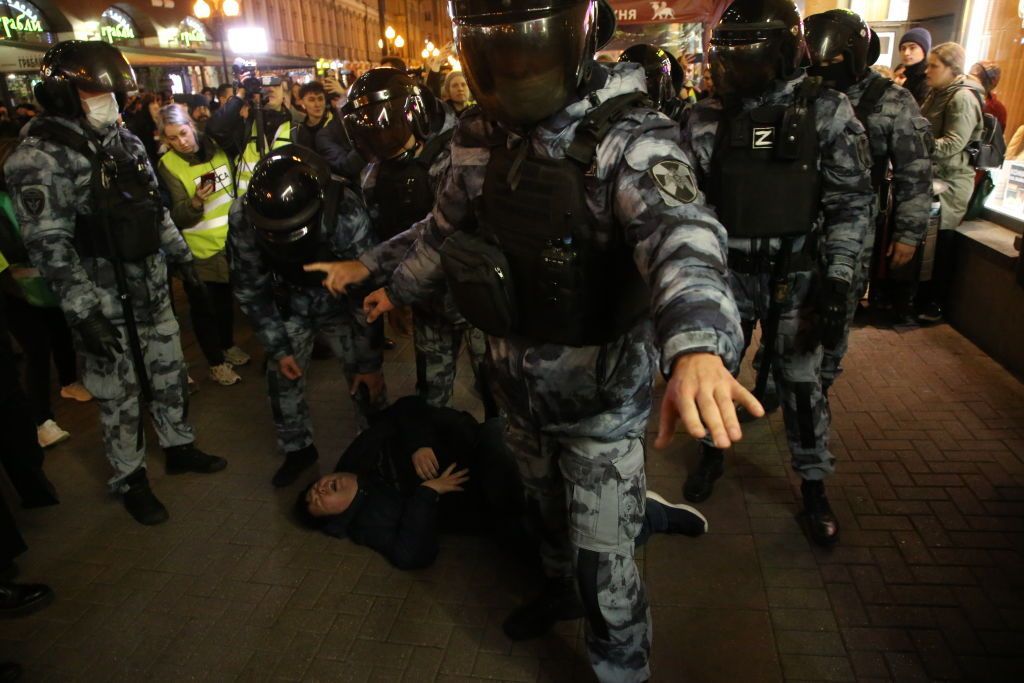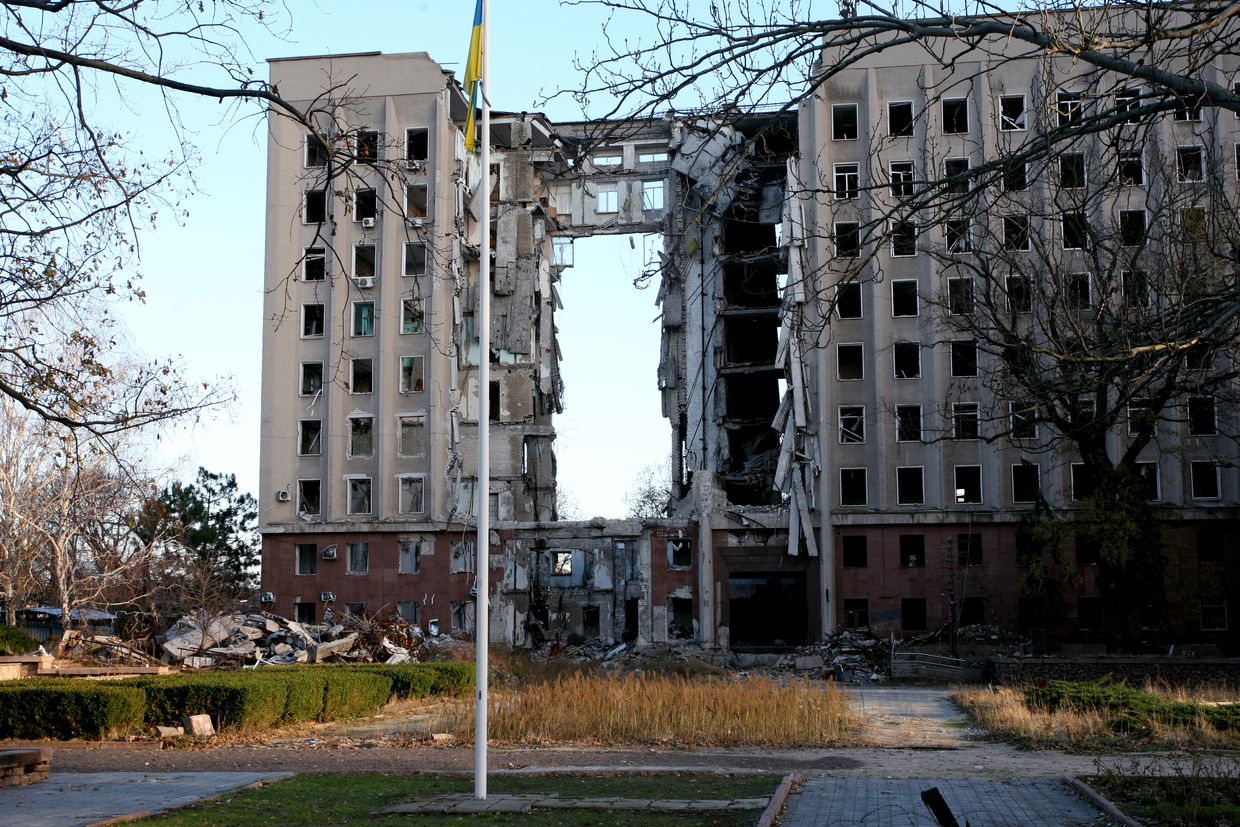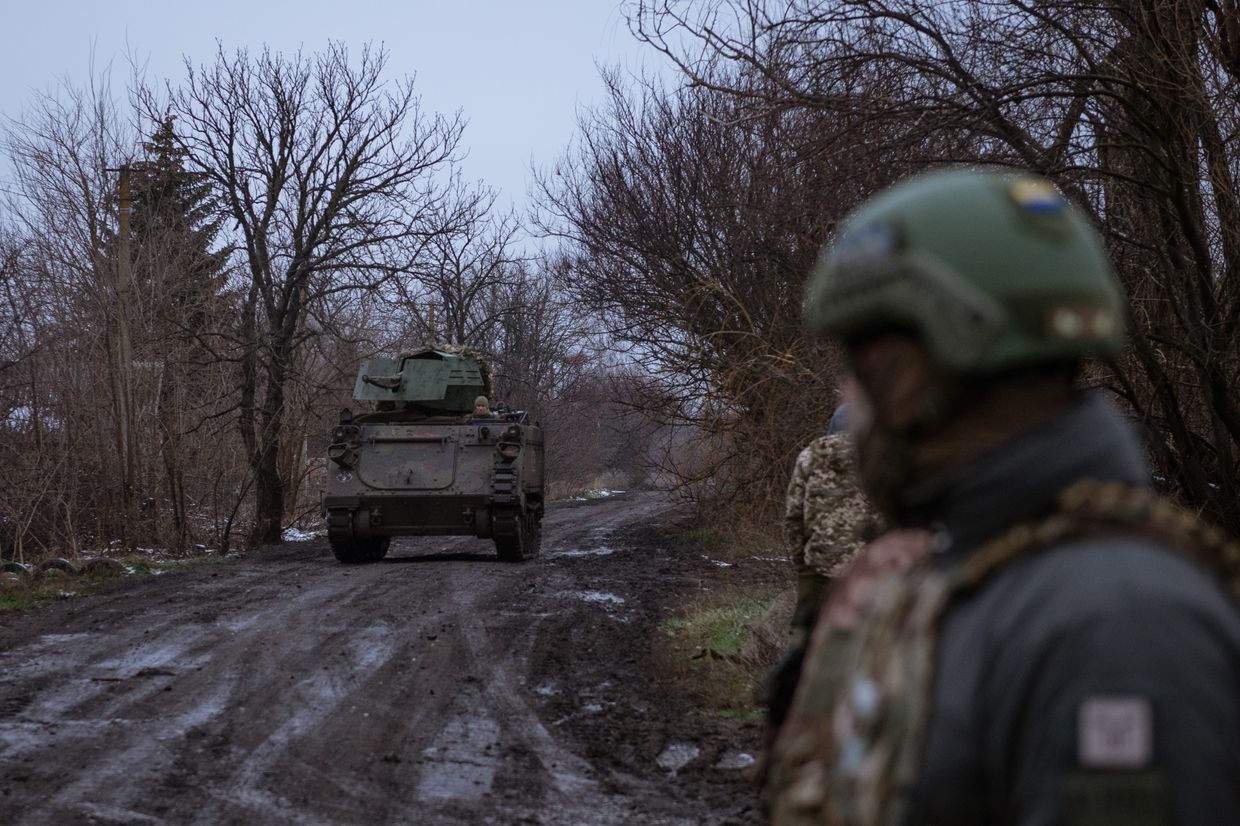Ukraine war latest: Biden announces $200 million in aid for Ukraine during Zelensky visit

Key developments on Dec. 12:
- Biden announces $200 million in aid for Ukraine
- Media: Russia lost 315,000 troops in Ukraine since Feb. 24, 2022
- US targets over 250 individuals, entities in major new Russia sanctions package
- Military intelligence hacks Russian tax authorities
- Hack on phone operator causes issues with air raid alert in Ukrainian regions
- Russia claims it shot down ballistic missile over Belgorod Oblast
- Danilov: Counteroffensive hopes did not come true.
The White House has allocated $200 million in drawdown funds for Ukraine, U.S. President Joe Biden told President Volodymyr Zelensky during his visit to Washington D.C. on Dec. 12.
Concerns for the continuation of U.S. support to Ukraine are growing after months of infighting in Congress over government spending, including military aid for Ukraine.
Biden did not specify the exact contents of the aid package, which will likely be one of the last until Congress passes additional funding. Drawdowns allow the White House to use Defense Department stocks to deliver military aid in crisis situations.
Biden said that if Congress fails to pass the Ukraine-Israel aid package, it would give Russian President Vladimir Putin “the greatest Christmas gift they could possibly give him.”
“Congress needs to pass supplemental funding for Ukraine before they break for the holiday recess,” he said.
U.S. National Security Council spokesperson John Kirby hinted on Dec. 11 that the White House was likely to arrange another support package for Ukraine before the end of 2023.
The Ukrainian head of state arrived in the U.S. on Dec. 11, seeking to reinvigorate support for Ukraine. A $61-billion funding request for Ukraine has been stalled amid political infighting in Congress and opposition from parts of the Republican Party.
Zelensky delivered his address to the U.S. Senate on Dec. 12, emphasizing the crucial role of Washington's support.
"A friendly, frank meeting in the U.S. Senate, which is an important affirmation of Ukraine's support in the fight for independence, freedom and democracy," Zelensky wrote on social media.
"(I) told senators about the current security and economic situation in Ukraine, the importance of maintaining vital American support."

Zelensky said he thanked Democratic Senate Leader Chuck Schumer and Republican Senate Leader Mitch McConnell for their "bipartisan support" for his country.
According to Schumer, Zelensky "made clear, and we all made clear, that if we lose, (Russian President Vladimir) Putin wins, and this will be very, very dangerous for the United States."
Previously, Zelensky was supposed to give an address to Congress on Dec. 5 ahead of a vote on a funding bill that included aid for Ukraine, but it was canceled at the last minute.
Republicans blocked the funding bill in a narrow vote on Dec. 6, insisting that any further aid for Ukraine or Israel must include significant changes to the U.S. border and immigration policy.
Media: Russia lost 315,000 troops in Ukraine since Feb. 24, 2022
Russia has lost 315,000 troops in Ukraine since the start of the full-scale invasion, representing nearly 90% of the military personnel it had in February 2022, multiple media reported on Dec. 12, citing a declassified U.S. intelligence report.
According to the report, Russia began its full-scale invasion of Ukraine with 360,000 personnel. By now, 87% have been killed or injured.
Russia is expected to launch a new mobilization drive in 2024, most likely after the presidential elections in March. The country declared a partial mobilization of 300,000 personnel in the autumn of 2022.
"The scale of losses has forced Russia to take extraordinary measures," such as allowing the recruitment of convicts and older civilians, the intelligence reportedly said.
The losses in personnel and armored vehicles "have set back Russia's military modernization by 18 years," a source familiar with the intelligence report told Reuters.
The Russian military is increasingly looking to recruit foreigners and migrant workers to fill the ranks, with reports emerging in distant countries like Cuba and Nepal of men being trafficked to fight for Russia in Ukraine.
Russian President Vladimir Putin signed a decree on Dec. 1 to increase the size of Russia's army by 170,000 people, bringing it to a new total of over 1.32 million military personnel.
The U.S. intelligence report corresponds with similar estimates of the scale of the Russian army's losses in Ukraine.
The U.K. Defense Ministry said on Dec. 4 that it estimates 320,000 Russian troops have been killed or injured since Russia launched its full-scale invasion of Ukraine.
Neither Moscow nor Kyiv releases public information about troop losses, but the Russian military's culture of dishonest reporting means that Russian officials themselves likely have a "low level of understanding" about casualty figures, the ministry said.
The Dec. 12 Ukrainian military update said that Russia has lost over 340,000 troops in Ukraine since the start of the full-scale invasion.
The New York Times reported in August that Russia's military casualties were nearing 300,000, citing U.S. officials. The figure included an estimated 120,000 deaths on the Russian side, which Moscow "routinely" undercounts, the report said.
Russian independent media outlet Mediazona, together with the BBC's Russian Service, confirmed on Dec. 1 the names of 38,261 Russian soldiers who have been killed since the beginning of the full-scale invasion.
The journalists said that the actual figures are likely considerably higher since the information they have verified so far comes from public sources, including obituaries, posts by relatives, news in regional media, and reports by local authorities.
US targets over 250 individuals, entities in major new Russia sanctions package
The U.S. Treasury and State departments announced fresh sanctions on Dec. 12 against over 250 individuals and entities in response to Russia's ongoing invasion of Ukraine.
"We will continue to use the tools at our disposal to promote accountability for Russia’s crimes in Ukraine and those who finance and support Russia’s war machine," U.S. Secretary of State Antony Blinken said in a statement.
The U.S. Department of the Treasury’s Office of Foreign Assets Control (OFAC) said it imposed sanctions on over 150 individuals and entities supplying Russia's military-industrial base.
"Treasury continues to take action to identify and disrupt third-country individuals, entities, and networks that facilitate, arrange, and enable the transfer of key technology, equipment, and inputs to Russian military-industrial base end-users," the announcement said.
"Today’s action once again underscores Russia’s utilization of Turkey, the United Arab Emirates (UAE), and the People’s Republic of China (PRC), as well as the use of complex transnational networks and third-country cut-outs, to acquire much-needed technology and equipment for its war economy," the statement continued.
While the newly announced measures primarily target Russia-based companies, they also target firms registered in China, Hong Kong, and Pakistan for facilitating and procuring Chinese-made weapons and technologies for Russia.
The U.S. Department of the Treasury also named companies in Turkey, the United Arab Emirates, and China for the shipment of technology, equipment, and inputs, including ball or roller bearings, aircraft parts, and X-ray systems.
The companies in China included commercial satellite imagery companies that the U.S. said gave observation imagery to the Russian mercenary group Wagner.
The U.S. State Department concurrently announced sanctions on over 100 entities and individuals, including those engaged in sanctions evasion in numerous third countries, complicit in furthering Russia's war effort in Ukraine.
The U.S. State Department also sanctioned individuals and entities from the metal, mining, energy, and arms manufacturing sectors.
Among those targeted are Chinese entities it said were involved in procuring microelectronic components, which it said were used to develop electronic warfare systems, for Russian state conglomerate Rostec, which is sanctioned by the U.S.
Companies in Russia, Turkey, and Hong Kong were also targeted.
The State Department further imposed sanctions against several Russian oligarchs and their networks and vessels supplying North Korean arms to Russia.
“The Kremlin has steadily turned Russia into a wartime economy, but (Russian President Vladimir) Putin’s war machine cannot survive on domestic production alone,” said U.S. Secretary of the Treasury Janet L. Yellen.
“Our sanctions today continue to tighten the vise on willing third-country suppliers and networks providing Russia the inputs it desperately needs to ramp up and sustain its military-industrial base.”
Despite a series of sanctions imposed against Moscow since the start of the full-scale war, Russia has managed to avoid some of these measures.
Russia's defense industry continues to purchase sanctioned dual-use goods via third-party countries and has avoided the $60-per-barrel price cap on seaborne oil by using a "ghost fleet" of tankers, sailing mostly without Western insurance.
Military intelligence hacks Russian tax authorities
Ukrainian cyber units hacked into thousands of servers of Russia's tax system, extracting sensitive information before destroying the tax database, Ukraine's military intelligence (HUR) said on Dec. 12.
The news follows reports on Nov. 29 that HUR orchestrated the hacking of television channels in Crimea to broadcast a speech by President Volodymyr Zelensky and that the Security Service of Ukraine (SBU) hacked into the website of Russia's Labor Ministry.
According to HUR, defense ministry and military intelligence cyber units hacked into the central server of the Federal Tax Service, as well as 2,300 regional servers in Russia and Russian-occupied Crimea, infecting them with malware.
The entire database of the tax system was destroyed, as well as backup copies, HUR said. Intelligence suggests that "Russia will not be able to fully resuscitate its tax system."
The Russian IT company Office.ed-it.ru, which operated a database of the Federal Tax Service, was also a victim of a similar attack.
The hacks resulted in the "complete destruction of the infrastructure of one of the main state bodies" of Russia and revealed a multitude of tax data, which is now in the hands of Ukraine, HUR said.
HUR did not specify the exact date of the hack but said that Russia has "been unsuccessfully trying to restore the work of the Russian tax authorities for the fourth day in a row."
Experts estimate that the Federal Tax Service will not be functional for "at least a month."
Hack on phone operator causes issues with air raid alert in Ukrainian regions
Air raid alert systems in some parts of Ukraine, including Kyiv Oblast, Sumy, and Dnipro, face technical issues due to the hack on telecommunications company Kyivstar, regional authorities reported on Dec. 12.
The news comes after a "massive" hacker attack was reported on Dec. 12 by Kyivstar, causing widespread internet and network outages. Monobank, one of Ukraine's largest banks, also reported a hack.
The air raid alert system in parts of Kyiv Oblast is not functioning due to issues with the Kyivstar network, Governor Ruslan Kravchenko said at around 4 p.m. on Dec. 12.
According to Kravchenko, the air raid alert is not functioning in some parts of Kyiv Oblast, including Bucha, Irpin, Vyshneve, and parts of Boryspil.
In another 75 settlements, the system was down but has been backed up by another warning system, according to Kravchenko. The air raid alert system in Kyiv itself is unaffected by the hack, Kyiv city authorities said earlier in the afternoon.
Emergency service workers and the police will use loudspeakers to signal the alert in case an area where the alert is not functioning is under threat of an attack, Kravchenko said.
The city of Sumy will sound the alert in the same way "while the specialists of the mobile operator eliminate technical malfunctions," the local military administration said.
The air raid system is "temporarily" not working due to ongoing issues with the operator Kyivstar, according to the military administration.
Issues with the air raid alert were also reported in Dnipro, the local authorities said on the afternoon of Dec. 12.
"Due to a hacker attack on the mobile operator "Kyivstar" in Dnipro, the local air alert system is not working," the Dnipro city council said.
The authorities advised residents to listen out for the alert on local radio stations and Telegram channels.
Kharkiv Regional Military Administration also reported issues with the air raid alert system, but did not explicitly point to the Kyivstar hack as the reason.
The authorities said the system was not fully functioning due to technical repairs being carried out and advised residents to use the official mobile application rather than rely on the sirens.
Kyivstar CEO Oleksandr Komarov released a video message at around 4 p.m. and said that the company was still working to restore the network.
It was "not completely clear" when the issue would be resolved, however. "The war with Russia has many dimensions, and one of them is in cyberspace," Komarov said.
The Security Service of Ukraine (SBU) announced it had opened criminal proceedings concerning the hack.
Russia has been repeatedly accused of backing cyber-crime groups in attacks against its rivals. Moscow has also deployed its cyber capabilities against Ukraine, including attacks on government institutions, the defense sector, and energy infrastructure.
Russia claims it shot down ballistic missile over Belgorod Oblast
Russia's Defense Ministry said that air defense working in Russia's western Belgorod Oblast shot down a Tochka-U ballistic missile in the early morning of Dec. 12.
It said that the missile was destroyed but did not comment on if it or subsequent debris caused any damage.
Vyacheslav Gladkov, the governor of Belgorod Oblast, said that air defense had shot down a "target" near the village of Bessonovka, about 30 kilometers from the city of Belgorod and close to 50 kilometers from the Ukrainian border.
Kyiv did not comment on the claim, and it cannot be independently verified.
Drones and missiles have targeted Russian territory intermittently since the beginning of the full-scale invasion. Ukraine usually does not comment on the strikes, which have reached as far as Moscow.
Danilov: Counteroffensive hopes did not come true
Ukraine's counteroffensive hopes did not come true, but that does not mean Kyiv will not eventually achieve victory, National Security and Defense Council Secretary Oleksii Danilov said in a comment for the BBC on Dec. 12.
The months-long counteroffensive launched by Ukrainian forces in early June achieved only modest advances and largely failed to reach its strategic goals.
"In May, every citizen in our country wanted the war to end quickly. There were hopes, but they didn't come true," Danilov said.
The long-anticipated campaign aimed to regain large swathes of territory captured by Russia in 2022 and to reach the Sea of Azov, cutting off Crimea from the occupied eastern regions and Russia.
Facing dense Russian defensive networks, Ukrainian forces managed to liberate only 14 villages in Donetsk and Zaporizhzhia oblasts.
As hostilities dialed down by December, top Ukrainian officials acknowledged that the counteroffensive did not achieve the desired results.
Ukraine's commander-in-chief, Valerii Zaluzhnyi, pointed out that despite NATO training for Ukrainian soldiers, the campaign was complicated by the lack of air superiority, a key element in NATO's doctrine.
"There hasn't been a war like the one we have in our country - not in the 20th nor the 21st century," Danilov commented, adding that old war textbooks, including NATO ones, "should be returned to the archives."
He nevertheless added that Ukraine would continue in its efforts to liberate its territory from Russian occupation.
"I can say for sure that we won't stop. We will continue fighting for our freedom, for our independence."


















